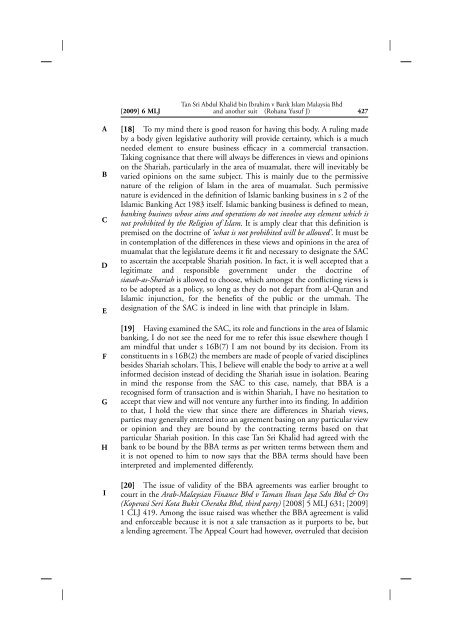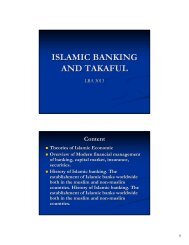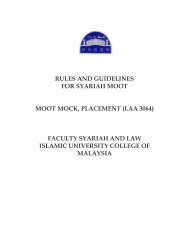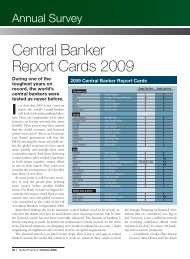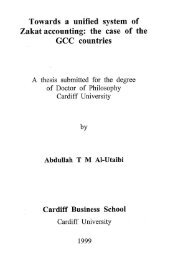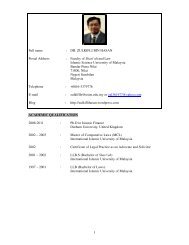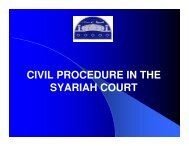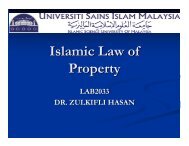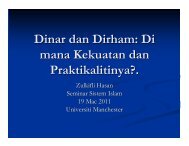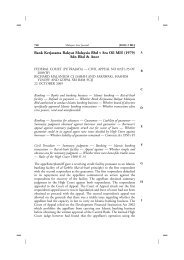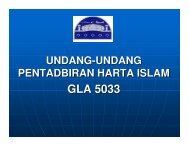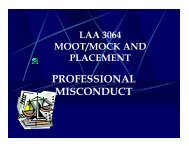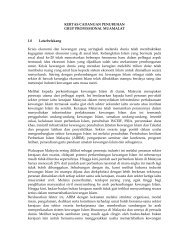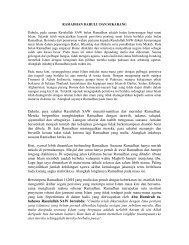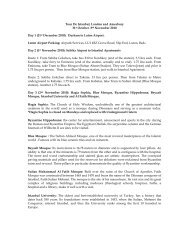Tan Sri Abdul Khalid bin Ibrahim v Bank Islam Malaysia Bhd and ...
Tan Sri Abdul Khalid bin Ibrahim v Bank Islam Malaysia Bhd and ...
Tan Sri Abdul Khalid bin Ibrahim v Bank Islam Malaysia Bhd and ...
You also want an ePaper? Increase the reach of your titles
YUMPU automatically turns print PDFs into web optimized ePapers that Google loves.
A<br />
B<br />
C<br />
D<br />
E<br />
F<br />
G<br />
H<br />
I<br />
<strong>Tan</strong> <strong>Sri</strong> <strong>Abdul</strong> <strong>Khalid</strong> <strong>bin</strong> <strong>Ibrahim</strong> v <strong>Bank</strong> <strong>Islam</strong> <strong>Malaysia</strong> <strong>Bhd</strong><br />
[2009] 6 MLJ <strong>and</strong> another suit (Rohana Yusuf J)<br />
427<br />
[18] To my mind there is good reason for having this body. A ruling made<br />
by a body given legislative authority will provide certainty, which is a much<br />
needed element to ensure business efficacy in a commercial transaction.<br />
Taking cognisance that there will always be differences in views <strong>and</strong> opinions<br />
on the Shariah, particularly in the area of muamalat, there will inevitably be<br />
varied opinions on the same subject. This is mainly due to the permissive<br />
nature of the religion of <strong>Islam</strong> in the area of muamalat. Such permissive<br />
nature is evidenced in the definition of <strong>Islam</strong>ic banking business in s 2 of the<br />
<strong>Islam</strong>ic <strong>Bank</strong>ing Act 1983 itself. <strong>Islam</strong>ic banking business is defined to mean,<br />
banking business whose aims <strong>and</strong> operations do not involve any element which is<br />
not prohibited by the Religion of <strong>Islam</strong>. It is amply clear that this definition is<br />
premised on the doctrine of ‘what is not prohibited will be allowed’. It must be<br />
in contemplation of the differences in these views <strong>and</strong> opinions in the area of<br />
muamalat that the legislature deems it fit <strong>and</strong> necessary to designate the SAC<br />
to ascertain the acceptable Shariah position. In fact, it is well accepted that a<br />
legitimate <strong>and</strong> responsible government under the doctrine of<br />
siasah-as-Shariah is allowed to choose, which amongst the conflicting views is<br />
to be adopted as a policy, so long as they do not depart from al-Quran <strong>and</strong><br />
<strong>Islam</strong>ic injunction, for the benefits of the public or the ummah. The<br />
designation of the SAC is indeed in line with that principle in <strong>Islam</strong>.<br />
[19] Having examined the SAC, its role <strong>and</strong> functions in the area of <strong>Islam</strong>ic<br />
banking, I do not see the need for me to refer this issue elsewhere though I<br />
am mindful that under s 16B(7) I am not bound by its decision. From its<br />
constituents in s 16B(2) the members are made of people of varied disciplines<br />
besides Shariah scholars. This, I believe will enable the body to arrive at a well<br />
informed decision instead of deciding the Shariah issue in isolation. Bearing<br />
in mind the response from the SAC to this case, namely, that BBA is a<br />
recognised form of transaction <strong>and</strong> is within Shariah, I have no hesitation to<br />
accept that view <strong>and</strong> will not venture any further into its finding. In addition<br />
to that, I hold the view that since there are differences in Shariah views,<br />
parties may generally entered into an agreement basing on any particular view<br />
or opinion <strong>and</strong> they are bound by the contracting terms based on that<br />
particular Shariah position. In this case <strong>Tan</strong> <strong>Sri</strong> <strong>Khalid</strong> had agreed with the<br />
bank to be bound by the BBA terms as per written terms between them <strong>and</strong><br />
it is not opened to him to now says that the BBA terms should have been<br />
interpreted <strong>and</strong> implemented differently.<br />
[20] The issue of validity of the BBA agreements was earlier brought to<br />
court in the Arab-<strong>Malaysia</strong>n Finance <strong>Bhd</strong> v Taman Ihsan Jaya Sdn <strong>Bhd</strong> & Ors<br />
(Koperasi Seri Kota Bukit Cheraka <strong>Bhd</strong>, third party) [2008] 5 MLJ 631; [2009]<br />
1 CLJ 419. Among the issue raised was whether the BBA agreement is valid<br />
<strong>and</strong> enforceable because it is not a sale transaction as it purports to be, but<br />
a lending agreement. The Appeal Court had however, overruled that decision


